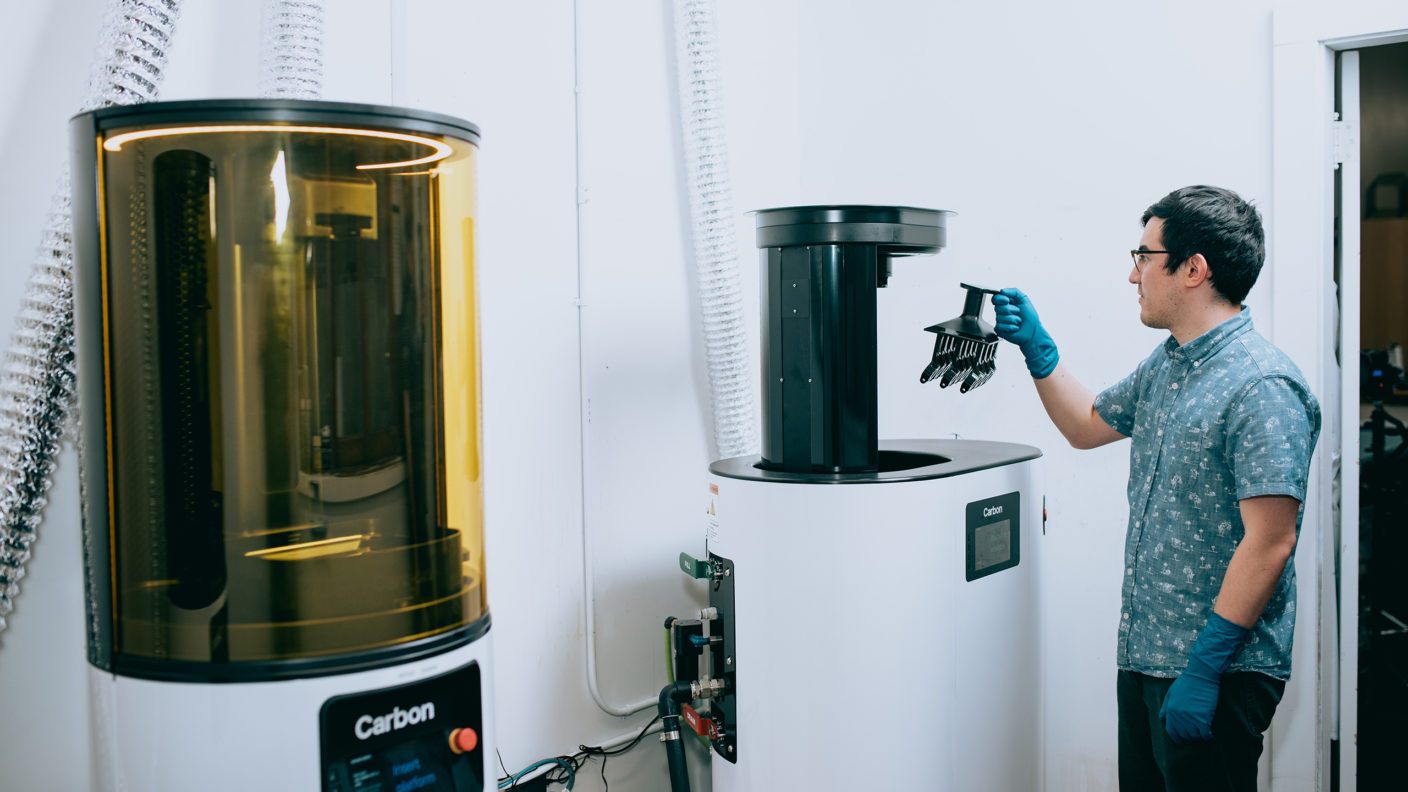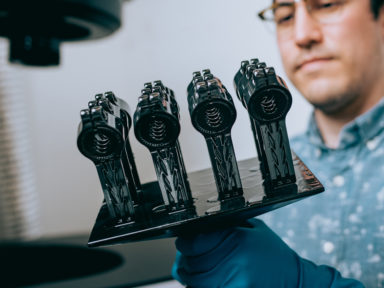
Capabilities
Carbon
3D Printing
At Sherpa, we believe that design is the catalyst for unlocking the extraordinary potential of the Carbon Digital Light Synthesis™ (Carbon DLS™) 3D printing process. We specialize in providing custom solutions for your 3D product design needs. Get ready to leverage the power of our cutting-edge Carbon printing services.
Design for Additive Manufacturing
As a full-service engineering and design firm, we offer concept development through prototyping, first article, and small batch production. We are experts in determining applications, materials, and processes for delivering quality rapid prototypes and end-use parts.
We can optimize your design for Carbon printers by minimizing support material, reducing hand finishing time, developing custom surface textures, and applying lattice structures.
Harness our team’s expertise to take advantage of digital printing technology for end-use-quality prototypes and bridge runs of 100–10,000 parts.
Benefits of 3D Printing with Carbon
- Improve testing cycles by prototyping with the final materials.
- Get to market faster by reducing product development cycles.
- Create variable density and performance out of a single material.
The Carbon DLS™ printing process is enabled by a thin, oxygen-permeable window and dual-cure materials. The use of dual-cure materials with a second heat-activated chemistry ensures that printed parts overcome the weaknesses and brittleness commonly associated with traditional resin-based 3D printing. This results in robust mechanical properties comparable to traditional manufacturing plastics, including injection molded parts.
Here’s how it works:
The resolution and gentleness of the Carbon process provides the ability to work with a wide range of materials, meeting the surface finish and detail requirements necessary for end-use parts. Furthermore, Carbon offers a range of materials that are comparable to traditional thermoplastics commonly used in manufacturing.
Carbon Design Partner
As the first Carbon Global Design Partner, we have been at the forefront leveraging digital tools for design for additive manufacturing (DfAM). We can assist with identifying applications, material selection, process development, and much more. Merging our design experience and on-site manufacturing helps us accelerate the product development process.
Partnering with Sherpa
At Sherpa, our focus is on high quality parts, delivered in a timely fashion.
We can take your design files and print them directly or suggest modifications to improve the outcome from the printing process. We do not believe in the “upload files and pray” approach. You will always have an additive manufacturing specialist on your project from initial review to final delivery.
Additive Manufacturing Shop and Carbon Resins
Our additive manufacturing shop has three Carbon M2 printers, one new M3 Max, a Smart Part Washer, and Carbon’s Design Engine.
Carbon materials come in both rigid and elastomeric forms that are comparable to common thermoplastics.
Learn about the shop and the resins with equivalent mechanical properties.
Contact Us
Ready to embark on a transformative engineering journey? Our team of experts is eagerly waiting to guide you through the possibilities of Carbon 3D Printing and engineering design. Contact us today to discuss your unique requirements and let us help you bring your ideas to life.
Carbon Design Guide
Download our free product design guide to Carbon DLS 3D Printing. This guide offers a multi-step workflow to help you design and support parts quickly.

Follow the steps below to determine if the part in question is a fit for DLS technology and can achieve first print success.
Optimize: Modify your part as needed to improve print quality and accuracy
Evaluate: Determine whether DLS technology and materials are a fit for your part.
Design: Design your part using the provided guidelines.
FAQs
what are turnaround times
Turnaround times are variable per project. We take into account: design time, part geometry, hand processing time, and current capacity. We strive to get projects turned in short order and will give you an estimate at the beginning of your project.
How can I prepare my project for production success?
The best way to increase production success is early involvement prior to design locks. Early involvement will give us time to thoroughly evaluate parts for Design for Additive Manufacturing (DfAM), make any changes and trial small preliminary runs.
Do you have automated quoting?
Not at the moment. We review every part for printability before providing a quote. Reviewing parts individually allows us to deliver quality parts and reduces the risk of printing incompatible geometries. It is common for us to reach out with questions to better understand the requirements of the parts..
